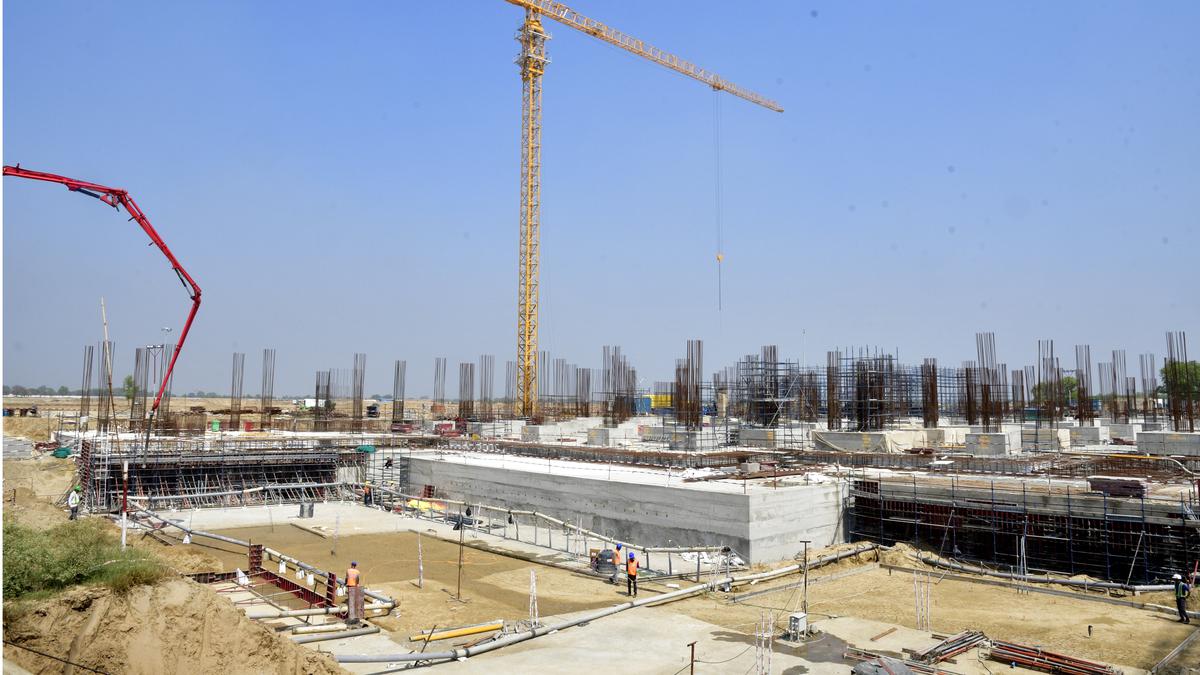
Uttar Pradesh government kicks off social impact assessment for third-phase of expansion for Noida airport
The Hindu
The Uttar Pradesh Government has issued a notification to carry out the ‘social impact assessment’ (SIA) for acquisition of another 2,053 hectares of land for the third phase of expansion for the upcoming Noida International Airport (NIA) in Jewar.
The Uttar Pradesh Government has issued a notification to carry out a ‘social impact assessment’ (SIA) for the acquisition of another 2,053 hectares of land for the third-phase of expansion for the upcoming Noida International Airport (NIA) in Jewar, according to officials.
A total of 1,888 hectares of land from 14 villages in Gautam Buddh Nagar’s Jewar tehsil is to be acquired, and the SIA is scheduled to be carried out by Gautam Buddh University and completed by this August 30, according to Mr. Arun Vir Singh, the CEO of Noida International Airport Limited (NIAL).
“The notification for acquisition of 2,053 hectares of land for the third-phase expansion of the airport was issued last week. Land for the first phase [1,365 ha.] and second phase [1,334 ha.] has already been acquired,” said Mr. Singh, who is also the CEO of the Yamuna Expressway Industrial Development Authority (YEIDA).
“As per the development plan of the airport, three runways would be developed in the third phase of the project, in addition to three runways that would be built during the first and the second phases of construction,” the IAS officer said.
Currently, the first-phase construction work for the airport is underway and is scheduled to be completed and ready for commercial operations by September 2024.
Yamuna International Airport Private limited (YIAPAL), a fully-owned subsidiary of Swiss firm Zurich Airport International AG, is developing the public-private Greenfield airport, some 75 km off Delhi.
The land for the third phase will be acquired after consent from the land owners under provisions of the Right to Fair Compensation and Transparency in Land Acquisition, Rehabilitation and Resettlement (Uttar Pradesh) Rules, 2016, according to the notification.

“Writing, in general, is a very solitary process,” says Yauvanika Chopra, Associate Director at The New India Foundation (NIF), which, earlier this year, announced the 12th edition of its NIF Book Fellowships for research and scholarship about Indian history after Independence. While authors, in general, are built for it, it can still get very lonely, says Chopra, pointing out that the fellowship’s community support is as valuable as the monetary benefits it offers. “There is a solid community of NIF fellows, trustees, language experts, jury members, all of whom are incredibly competent,” she says. “They really help make authors feel supported from manuscript to publication, so you never feel like you’re struggling through isolation.”

Several principals of government and private schools in Delhi on Tuesday said the Directorate of Education (DoE) circular from a day earlier, directing schools to conduct classes in ‘hybrid’ mode, had caused confusion regarding day-to-day operations as they did not know how many students would return to school from Wednesday and how would teachers instruct in two modes — online and in person — at once. The DoE circular on Monday had also stated that the option to “exercise online mode of education, wherever available, shall vest with the students and their guardians”. Several schoolteachers also expressed confusion regarding the DoE order. A government schoolteacher said he was unsure of how to cope with the resumption of physical classes, given that the order directing government offices to ensure that 50% of the employees work from home is still in place. On Monday, the Commission for Air Quality Management in the National Capital Region and Adjoining Areas (CAQM) had, on the orders of the Supreme Court, directed schools in Delhi-NCR to shift classes to the hybrid mode, following which the DoE had issued the circular. The court had urged the Centre’s pollution watchdog to consider restarting physical classes due to many students missing out on the mid-day meals and lacking the necessary means to attend classes online. The CAQM had, on November 20, asked schools in Delhi-NCR to shift to the online mode of teaching.









